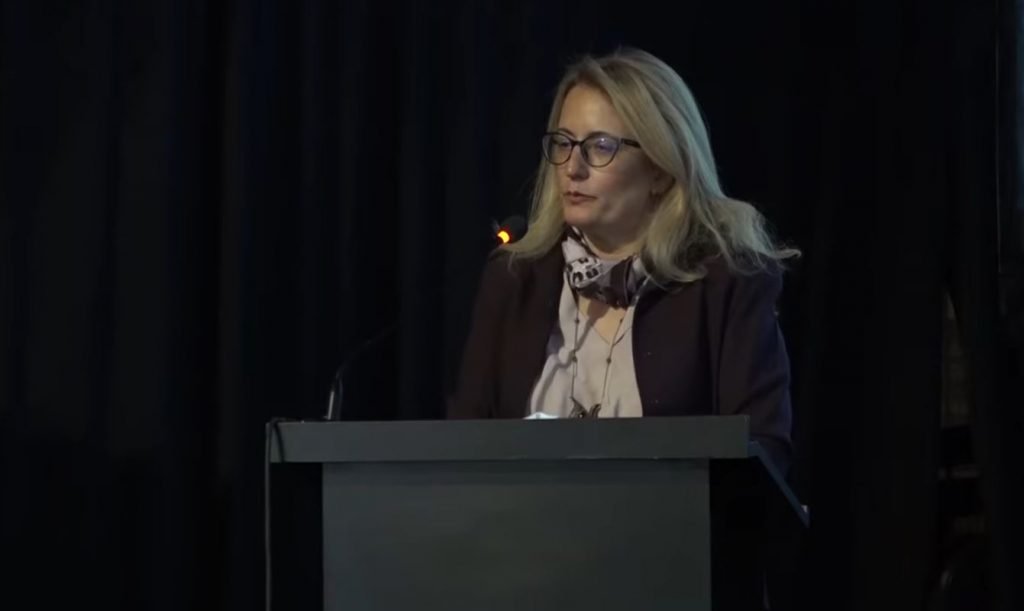Turkish Ambassador to Georgia, Fatma Ceren Yazgan stirred controversy and faced backlash from Georgian activists following her critical remarks about ongoing protests against the Namakhvani Hydropower Project. The project is largely implemented by Turkey-based Enka company near the western Georgian city of Kutaisi.
Ambassador’s Controversial Remarks
In her recent address about the project, the Turkish Ambassador reiterated her concerns that the campaign against the Namakhvani HPP is “taking a form of political and anti-Turkish nature.” She alleged that seeing “a cross being put in the middle of the construction site” by the protesters was “an open reference to a religious discrimination or like using the religion in defending the environment.”
In another controversial remark, the Ambassador said while there are in Georgia people generally protesting the hydropower plants, “their numbers are not up to 4,000 or 5,000 people that who you would see in Kutaisi [protesting the HPP construction], or they are not the people who are necessarily putting a cross” – supposedly alluding that crowds protested in Kutaisi twice against the project only because of the Turkish company being behind the construction.
Ambassador Yazgan also recalled that after the CSO complaints she checked environmental concerns with ENKA: “we found out that those who are raising those concerns do not have any studies, do not have any scientific input, to be challenged or mitigated by scientific factual information.”
The Turkish Ambassador then also stated that in one case almost all locals took the expropriation money, except for “this one guy who keeps building his house so that the cost increases.”
Local Activists Getting Upset
The construction of the Namakhvani HPP Project in western Georgia has been opposed by thousands for months now. The opponents – citing devastating environmental concerns and the questionable investor agreement harmful to the state, and the economy – hosted two massive rallies in Kutaisi against the project. In the meantime, the locals have been taking protest shifts in tents near the construction site for around 160 days.
Reacting to the diplomat’s remarks, Fair Energy Politics Collective, Georgian activist movement backing Namakhavni protests, wondered whether Ambassador Yazgan would advise the Turkish state to conclude “similarly cabal agreement with a foreign company,” or whether it is an activist group or the company itself, that is responsible to conduct research about similar project’s environmental impact.
“In her address, Turkish Ambassador Fatma Ceren Yazgan is once again shamelessly accusing the movement against Namakhvani HPP in Turkophobia, and is employing religious and national[ist] motives in the population to discredit them,” noted the group, adding that the Turkish envoy “is deceiving us that in reality the number of protesters is smaller than it appears.”
Local activist Maka Suladze, known for her fierce resistance to selling her native land for the Namakhavni powerplant construction, also weighed in: “Ms. Fatma, you’d be surprised, but participants of protests do carry crosses on their chests.”
“I was surprised that I am an opposition member without my knowledge,” the activist wrote ironically upon sharing the video of the Turkish Ambassador’s controversial address.
The controversy comes as the Georgian authorities have openly slammed the anti-HPP movement over “xenophobic,” “anti-Turkish” and surprisingly, for “homophobic” sentiments.
The activists leading the resistance movement have continuously and vocally denied the claims and repeatedly expressed fears that allegations may be misused by the authorities to discredit the protest movement.
The Namakhvani project encompasses two separate HPPs of 333 MW and 100 MW on the Rioni River. The government hopes to enhance its energy security and to employ up to 1,600 Georgians with the “foreign direct investment in the amount of USD 800 million.”
Also Read:
- Massive Anti-Namakhvani HPP Protest in Kutaisi Demands Economy Minister Resignation
- Massive Rally Held in Kutaisi Against Namakhvani HPP
- Namakhvani Dam, Reservoir to Undergo Additional Safety Checks, Economy Minister Says
- Locals, Police Clash Again over HPP Construction in Imereti
- Namakhvani HPP Works Resume Defying Local Protest
This post is also available in: ქართული (Georgian) Русский (Russian)

